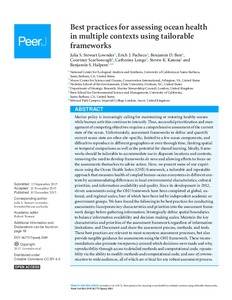Best practices for assessing ocean health in multiple contexts using tailorable frameworks.

View/
Average rating
votes
Date
2015Author
Lowndes, Julia S.S.
Pacheco, Erich J.
Best, Benjamin D.
Scarborough, Courtney
Longo, Catherine
Katona, Steven K.
Halpern, Benjamin S.
Metadata
Show full item recordAbstract
Marine policy is increasingly calling for maintaining or restoring healthy oceans while human activities continue to intensify. Thus, successful prioritization and management of competing objectives requires a comprehensive assessment of the current state of the ocean. Unfortunately, assessment frameworks to define and quantify current ocean state are often site-specific, limited to a few ocean components, and difficult to reproduce in different geographies or even through time, limiting spatial or temporal comparisons as well as the potential for shared learning. Ideally, frameworks should be tailorable to accommodate use in disparate locations and contexts, removing the need to develop frameworks de novo and allowing efforts to focus on the assessments themselves to advise action. Here, we present some of our experiences using the Ocean Health Index (OHI) framework, a tailorable and repeatable approach that measures health of coupled human-ocean ecosystems in different contexts by ac.....
Resource URL
https://peerj.com/articles/1503/Journal
PeerJVolume
3Issue
e1503Document Language
enSustainable Development Goals (SDG)
SDG14.1Best Practice Type
Best PracticeGuide
DOI Original
https://doi.org/10.7717/peerj.1503Citation
Lowndes, J.S..; Pacheco, E.J.; Best, B.D., Scarborough, C.; Longo, C.; Katona, S.K. and Halpern, B.S. (2015) Best practices for assessing ocean health in multiple contexts using tailorable frameworks. PeerJ 3:e1503. DOI: https://doi.org/10.7717/peerj.1503Collections
The following license files are associated with this item:
 Repository of community practices in Ocean Research, Applications and Data/Information Management
Repository of community practices in Ocean Research, Applications and Data/Information Management
